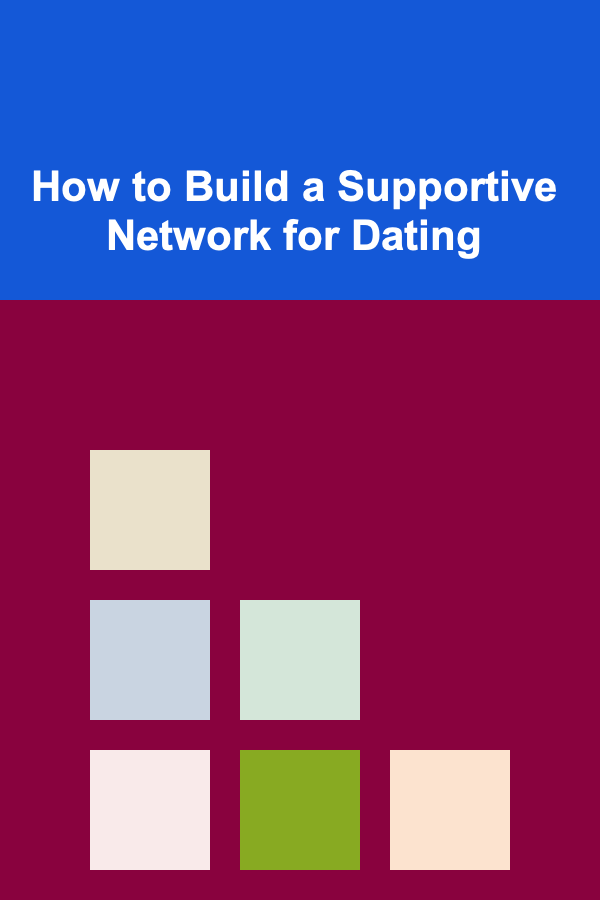
How to Build a Supportive Network for Dating
ebook include PDF & Audio bundle (Micro Guide)
$12.99$7.99
Limited Time Offer! Order within the next:

Building a supportive network for dating is an essential step in creating lasting, meaningful relationships. Dating can be a complex, emotional journey that requires a balance of self-awareness, communication, and trust. While the pursuit of love can sometimes feel solitary, having a supportive network can help individuals navigate the ups and downs of dating with greater ease and confidence. This network may include close friends, family members, mentors, or even online communities, each playing a unique role in providing advice, encouragement, and emotional support.
A strong support system can offer both practical and emotional benefits. It can provide feedback on dating choices, offer reassurance when things don't go as planned, and encourage personal growth. In this article, we'll explore the various steps and strategies to build a supportive network that will serve you in your dating life, helping you not only meet potential partners but also develop healthy relationships with them.
Understand the Importance of a Supportive Network in Dating
Before diving into the specifics of building a supportive network, it is important to understand why it matters. Dating is not just about meeting someone and forming a romantic connection; it involves emotional vulnerability, self-discovery, and navigating complex interpersonal dynamics. A supportive network can help individuals make sense of these experiences by offering guidance, empathy, and insight.
Here are several key reasons why a supportive network is vital:
- Emotional Support: Dating can be emotionally draining, especially if relationships don't work out. Having a support network helps individuals process rejection, disappointment, and the inevitable challenges that arise in romantic pursuits.
- Accountability: A strong support system can hold you accountable to your own relationship goals, whether it's staying true to your values, maintaining boundaries, or making healthy choices.
- Feedback and Perspective: Friends and family can provide an outside perspective on potential partners, helping you avoid repeating past mistakes or seeing things in a distorted way.
- Encouragement and Confidence: Having a reliable network of supporters can boost your self-esteem and encourage you to take risks, whether it's asking someone out, having difficult conversations, or committing to a relationship.
- Social Validation: A supportive network can also offer validation for your relationship choices. They can act as a sounding board for ideas and decisions, making you feel more confident in your dating life.
Identify the Core Members of Your Supportive Network
Creating a network of support for dating is not about quantity but quality. While it may be tempting to involve everyone you know, it's essential to identify individuals who will genuinely have your best interests at heart. These core members should be people who are trustworthy, empathetic, and able to offer constructive feedback.
Here are the primary groups of people who might make up your supportive network:
2.1. Close Friends
Your close friends are often the first people you turn to for dating advice. These are the individuals who know you best---your values, your personality, and your goals. Close friends are valuable in providing emotional support, listening without judgment, and giving advice based on your history and character.
Qualities of Good Friends for Dating Support:
- Non-Judgmental: They should be able to offer honest feedback without criticizing or dismissing your feelings.
- Empathetic: Understanding that dating is emotionally charged and supporting you through the highs and lows.
- Objective: While they may have personal biases, a good friend should try to give advice based on what's best for you, not necessarily what aligns with their own experiences or opinions.
2.2. Family Members
Family members, particularly those who have been through their own relationships, can offer invaluable wisdom. Parents, siblings, and extended family members can provide long-term perspectives on what constitutes a healthy relationship and what pitfalls to avoid.
However, it's important to recognize that family dynamics can sometimes be more complicated than friendships. While many family members may offer sound advice, others may struggle with letting go of old expectations or may be more critical of your choices. Therefore, it's important to assess which family members are supportive and constructive.
Key Considerations for Family Support:
- Balanced Perspective: Family members who are able to see both your strengths and weaknesses can give you well-rounded advice.
- Understanding Boundaries: They should respect your personal life and choices, offering support rather than control.
- Generational Insight: Older family members, especially those who have been in relationships for a long time, may have valuable perspectives on the endurance and complexities of love.
2.3. Mentors and Coaches
A mentor, coach, or therapist can be an excellent addition to your dating support network. These individuals are often more objective than friends or family and can provide professional advice tailored to your specific needs. A relationship coach, for example, can help you identify patterns in your dating life, develop healthier approaches to relationships, and build confidence in dating situations.
2.4. Online Communities and Support Groups
In addition to the people you interact with personally, online communities and dating support groups can be helpful in gaining different perspectives. These groups often provide a space for individuals to share their experiences, seek advice, and offer encouragement to others facing similar challenges. Online dating forums, Reddit communities, or social media groups focused on relationships can be excellent platforms for meeting others who can offer empathy and practical tips.
2.5. Trusted Colleagues or Acquaintances
Sometimes, professional connections can also serve as valuable members of your support network. Colleagues who understand the demands of your life may be able to offer practical advice about maintaining work-life balance while dating, or they may be able to introduce you to potential partners. However, it's important to maintain boundaries and ensure that the connection remains professional.
Establishing Boundaries Within Your Network
While a supportive network is crucial, it's equally important to establish clear boundaries. It's easy for friends, family, or even a mentor to overstep their role if they feel too invested in your dating life. Setting boundaries ensures that your support network is a positive force and doesn't lead to unnecessary pressure or overbearing advice.
3.1. Define Your Needs
Before seeking advice or sharing your dating experiences, define what you need from your support system. Are you looking for emotional support? Do you need honest feedback? Or do you simply want someone to listen without offering advice? Knowing what you need allows you to communicate effectively with your network and ensures that everyone understands their role.
3.2. Be Clear About Expectations
Make it clear with your support network about how much involvement you want. For instance, some people may want to share every detail of their dating life with their friends, while others may prefer a more private approach. Respect your own needs and those of others in the network. Additionally, be prepared to speak up if someone is overstepping or giving you advice you don't need or want.
3.3. Avoid Over-Consulting
While it's tempting to seek advice from multiple sources, constantly seeking validation can confuse you and delay your decision-making. Instead, try to consolidate your support network and take time to reflect on the advice you receive. Trust yourself to make decisions with the input you've gathered.
How to Strengthen Your Supportive Network
Once you've identified the core members of your dating network, you need to cultivate and strengthen those relationships. A network is not something you simply "build" once; it's something you nurture over time.
4.1. Open Communication
Honest communication is the cornerstone of any strong relationship, whether it's with a friend, family member, or mentor. Be clear about what you're looking for in terms of support and feel comfortable sharing both your successes and setbacks in your dating life. Vulnerability can deepen your connection with those in your network and encourage them to be more invested in your journey.
4.2. Regular Check-Ins
It's important to check in with your support system regularly. You don't want to wait until a dating crisis to reach out. Regularly updating your network about your dating life can help them stay involved and informed, making it easier to ask for support when you truly need it.
4.3. Give Back
Support is a two-way street. It's not only about receiving help but also about offering it in return. If a friend, family member, or mentor needs support, be there for them just as they have been for you. Building a supportive network means creating reciprocal relationships where everyone's needs are met.
Avoid Toxic Influences
Not all advice or support is beneficial. Some people in your network may have outdated views on relationships, or they may inadvertently undermine your dating efforts. Here are some signs of toxic support:
- Constant Criticism: While constructive criticism is helpful, constant negativity or disparaging remarks can damage your self-esteem and confidence.
- Over-Interference: Some individuals may try to control your dating choices or force their opinions on you. While their intentions may be good, it's essential that you make your own decisions.
- Telling You What You Want to Hear: While honesty is crucial, some people may try to protect your feelings by avoiding difficult truths. A good support network should help you grow, even if the advice is uncomfortable.
5.1. Recognize and Distance Yourself from Negative Influences
If a friend or family member consistently undermines your dating experiences, it's okay to set boundaries with them. Surround yourself with individuals who respect your choices and help you grow rather than stifle you. Healthy relationships in your support network are just as important as healthy relationships in your dating life.
Conclusion
Building a supportive network for dating is essential for navigating the complex landscape of relationships. By surrounding yourself with trusted friends, family members, mentors, and communities, you create a foundation of emotional and practical support. Remember that the purpose of a support network is to uplift and guide you, helping you grow as an individual while navigating the exciting and sometimes challenging world of dating.
As you continue to develop this network, be mindful of boundaries, open communication, and the need to maintain balance. With the right support system in place, you'll be better equipped to make empowered decisions, form meaningful connections, and ultimately build a lasting relationship with someone who aligns with your values and goals.

How to Create an Emergency Escape Plan for Your Family
Read More
How to Refresh Your Bathroom Decor with Inexpensive Accessories
Read More
How to Save Money on Home Repairs with DIY Solutions
Read More
How to Save on Utility Bills with Simple Home Adjustments
Read More
How to Use Pegboards for Creative Storage Solutions
Read More
How to Find Internship Opportunities
Read MoreOther Products

How to Create an Emergency Escape Plan for Your Family
Read More
How to Refresh Your Bathroom Decor with Inexpensive Accessories
Read More
How to Save Money on Home Repairs with DIY Solutions
Read More
How to Save on Utility Bills with Simple Home Adjustments
Read More
How to Use Pegboards for Creative Storage Solutions
Read More